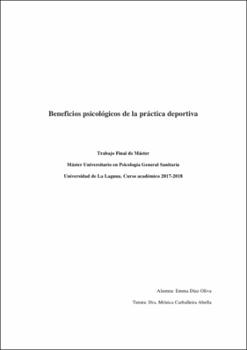Beneficios psicológicos de la práctica deportiva
Autor
Díaz Oliva, EmmaFecha
2018Resumen
The main objective of the present study was to analyze the relationship between sports
and psychological variables such as personality, optimism, self-esteem, basic
psychological needs, and subjective well-being (positive and negative affect, happiness,
and life satisfaction). The whole sample was formed by a normative group of 147
participants (58.5% female) who practiced different sports (athletes), and a critical
group of 162 individuals (68.5% female) who did not perform any physical activity
(non-athletes); all of them aged between 19 and 35 years. Significant differences were
found among the participants of the normative group in terms of competence in sports.
Those athletes practicing competitive sports had greater autonomy, more relationships
and positive affect, whereas those athletes who did not practice, had a greater
extraversion. The normative group had greater optimism, self-esteem, positive and
negative affect and happiness, and the critical group scored higher in life satisfaction.
The findings give complementary information about the psychological profits of sport. El objetivo principal del presente estudio fue analizar la relación entre el deporte y
variables psicológicas como personalidad, optimismo, autoestima, necesidades
psicológicas básicas y bienestar subjetivo (afecto positivo y negativo, felicidad y
satisfacción con la vida). La muestra completa estuvo formada por un grupo normativo
(N=147) (58.5% mujeres) que practicaban diferentes deportes (deportistas), y un grupo
crítico (N=162) (68.5% mujeres) que no realizaban actividad física (no deportistas);
todos ellos con edades entre 19 y 35 años. Se encontraron diferencias significativas
entre los participantes del grupo normativo, de tal forma que los deportistas que
practicaban deportes de competición, tenían mayor autonomía, más relaciones y afecto
positivo; mientras que aquellos que no los practicaban, eran más extravertidos. El grupo
normativo presentó más optimismo, autoestima, afecto positivo y negativo y felicidad,
estando el grupo crítico más satisfecho con la vida. Los hallazgos ofrecen información
complementaria sobre los beneficios psicológicos del deporte.




